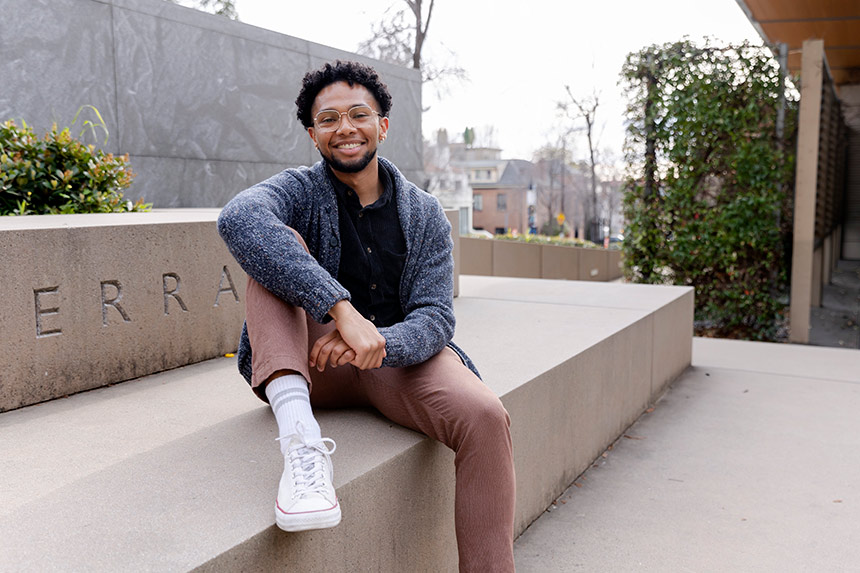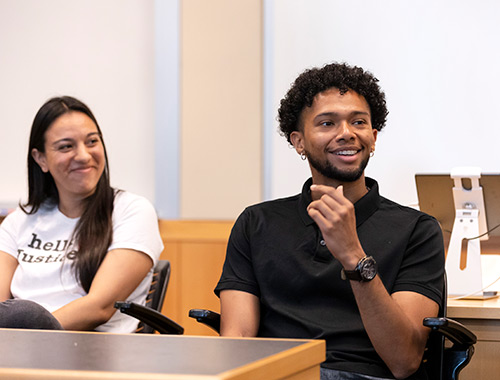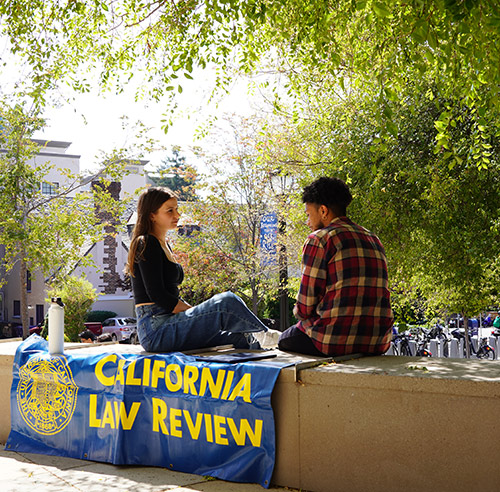
By Andrew Cohen
Arguments that lead to law school often take place in college debate tournaments, philosophy classes, or political student organizations. For 2L Dominick Williams they happened in Lord Tony’s, a Sacramento barbershop.
“Tony was the shop owner and talked the loudest, which I guess would have intimidated most kids. But I thought he was the coolest one there,” Williams says. “He gave me my first ‘job’ when I was 12. I was too young to have an actual job, so he’d give me 20 bucks for sweeping hair and cleaning windows on the weekends.
“The ‘Who’s greater: Kobe or Lebron?’ arguments and the older barbers’ magnificent stories were a chorus over the dull hum of their clippers. I absorbed their wisdom, experience, and confidence so much that from a young age I sounded persuasive … Just that bit of exposure over a couple of summers set me on this path.”
Williams is now editor in chief of the California Law Review (CLR), Berkeley Law’s prestigious flagship student journal, after serving as associate editor. While career goals motivate many who pursue such a lofty position, he had other incentives.
“I sought to learn the language of power,” Williams says. “The law is gate-kept, empowering the few at the expense of the rest. As the first in my family to go to law school, I attended Berkeley Law to learn the law so I could empower those around me.”
Eager to expand the journal’s accessibility to potential readers and members while keeping its excellence front and center — a delicate balance he aims to strike with intention and care — Williams adds, “I want any Berkeley law student who joins CLR to know they’re in the impact business and that they belong here.”
Timely experience
Williams wasted little time diving into the journal world. As a 1L, he became editor in chief of the Berkeley Journal of Black Law & Policy and an associate editor of the Berkeley Technology Law Journal.
“The Journal of Black Law & Policy taught me the importance of vision,” he says. “Its tradition of taking big leaps and speaking on important issues is the spirit that I invoked while editor in chief. Now, as editor in chief of CLR, I seek to similarly lead our membership beyond our horizons to speak on the important issues we’re facing across the legal field.”

Leadership roles are nothing new for Williams. While a UC Berkeley undergrad, he was a UC Student Association legislative director — authoring a state budget proposal that secured $22.5 million in funding to student-initiated opportunity programs. He set up meetings with policymakers and built coalitions with campus and state stakeholders to address issues such as college affordability, basic needs security, sexual assault prevention, campus diversity, and mental health services.
Williams also served as government relations vice chair and campaign chair, expanding recruitment and retention efforts of underrepresented students at UC campuses, increasing higher education funding for impoverished students and their families, reinstituting undocumented student services, and voicing students’ legislative priorities.
Later a legislative assistant for California’s Secretary of State and the State Assembly, Williams also worked as a legislative analyst for Assemblymember Shirley Weber and interned for Congresswoman Barbara Lee as well as the Supreme Court of California. He has received several scholarships for his achievements and is now a research assistant for Berkeley Law Professor Andrea Roth.
“I didn’t know Dominick until he was a 2L in my Criminal Procedure: Investigations class. He always had really insightful questions during and after class, and he seemed interested in scholarship in particular — what academics were and weren’t talking about and how to puzzle through the big questions,” she says. “I was also impressed with an idea he had for a student note.
“By the end of the semester I asked if he was interested in being my research assistant, and luckily he said yes. He’s been doing interesting work on speed trial rights and ‘systemic breakdown’ of counsel services that I actually note in my course reader and hope to cite when it’s published. Dominick is a careful but courageous thinker, humble but confident — a nice combination in a leader.”
Close to home
With examples of unequal treatment and disproportionate punishment of Black people blanketing the legal landscape, Williams brings visceral experiences to his role as CLR editor in chief. While in college, he recalls refusing to leave his house without a backpack on, regardless of his destination.

“I was too afraid to walk the streets without it because I feared being profiled as a criminal,” Williams says. “Since I was 16, the moments of my life have been stitched together by a thread of traumatic deaths of Black men who didn’t deserve to die: Trayvon Martin, Eric Garner, Stephon Clark, and so on.
“I endure it by enduring. I don’t forget where I come from and what motivations I bring, and I see CLR as a way for all of us who wish to endure as I do to place their stamp on the law. I’m at the helm of an organization that people read and pay attention to. During my tenure, I’ll continue to guide CLR on its journey of speaking on our society’s ailments, critiquing our institutions, and bringing insights that will inspire new solutions.”
Williams has also been active with Berkeley Law’s Startup Law Initiative and the California Reparations Task Force. Noting that momentum for reparations for African Americans in California is at an all-time high, he remains “clear-eyed that this is a controversial topic” but says, “that is exactly why the discussion must be had.”
Just before he left to begin law school, Williams paid another visit to Lord Tony’s.
“Tony was proud to see that I graduated from college and was intent on becoming a lawyer,” Williams says. “Seeing him and the barbershop that was home away from home reminded me of my own dedication and perseverance, and reinforced why I’m a zealous advocate.”